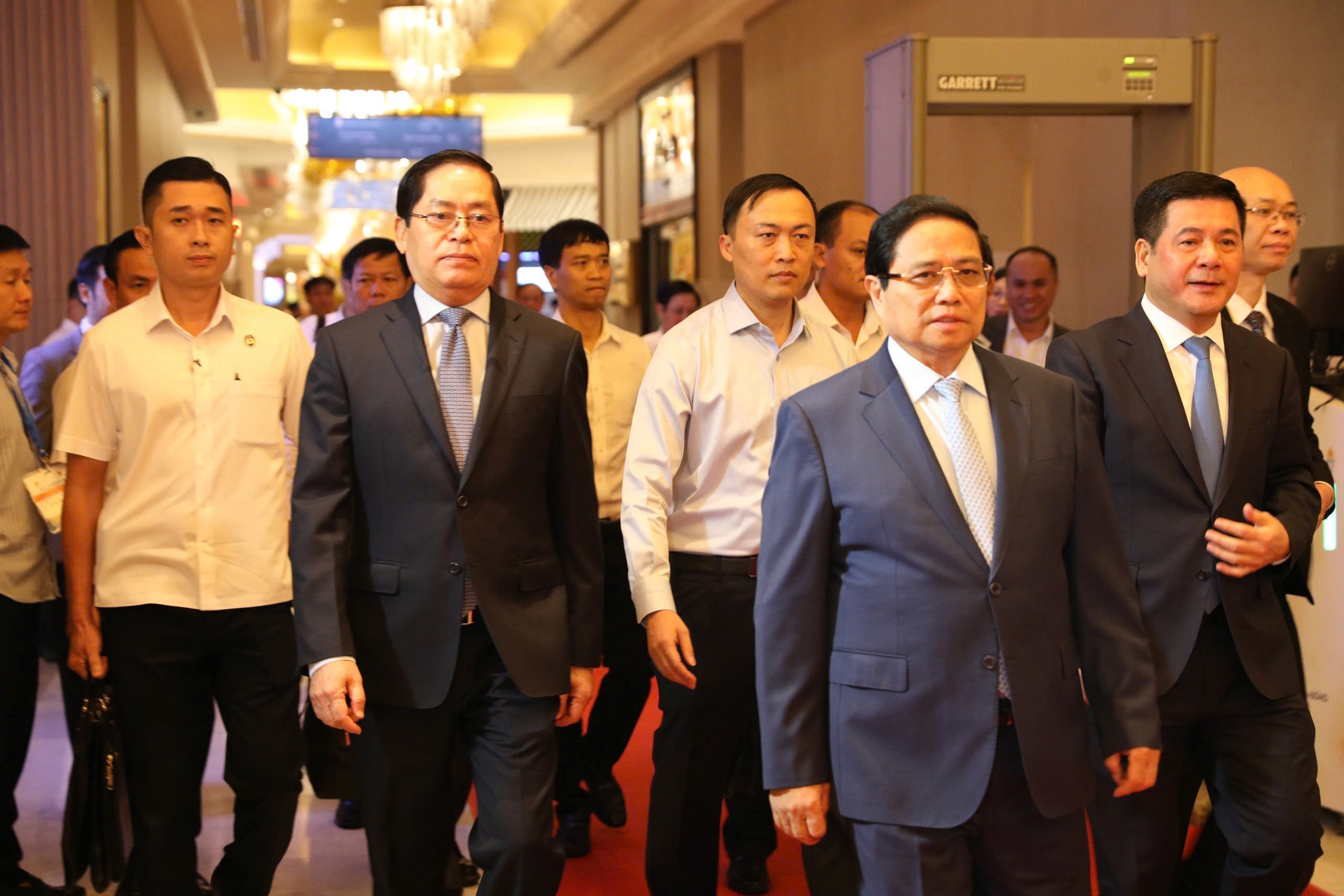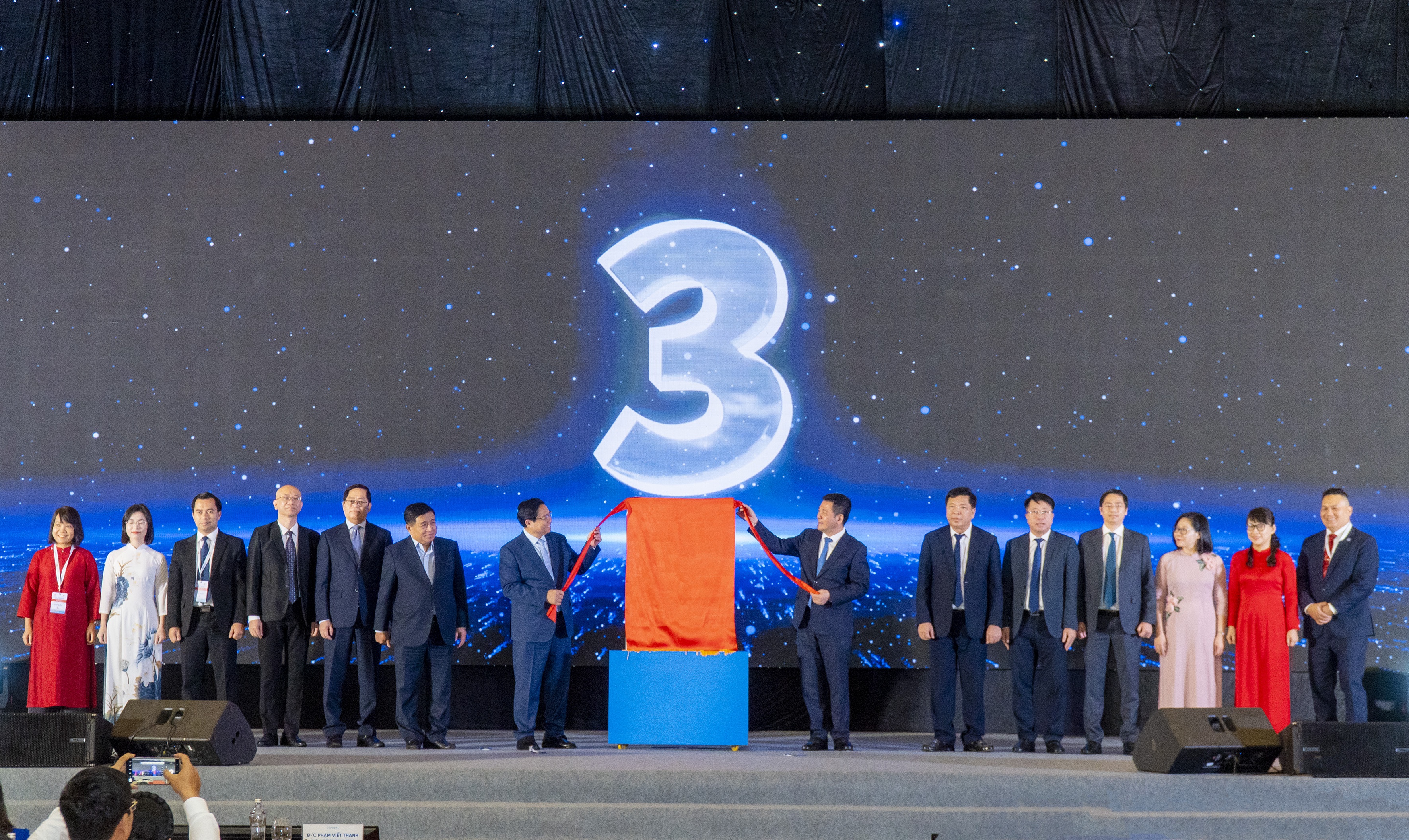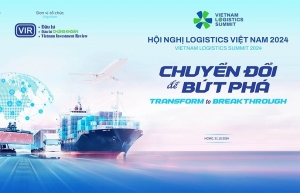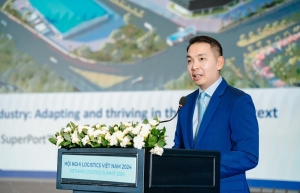FTZs to open regional doors for logistics
At the Vietnam Logistics Forum last week, held in the southern province of Ba Ria-Vung Tau, Minister of Industry and Trade Nguyen Hong Dien highlighted the critical role of free trade zones (FTZs) in strengthening economic competitiveness.
 |
| PM Pham Minh Chinh, leaders of Ministry of Industry and Trade and leaders of Ba Ria-Vung Tau Province at the Vietnam Logistics Forum 2024, Photo: Tien Phong |
“FTZs are an essential tool for countries to maximise the benefits of integration,” said Minister Dien. “Successful examples like Singapore, China, South Korea, and the UAE demonstrate how FTZs reduce costs, boost product competitiveness, optimise goods flows, improve logistics capacity, and attract foreign funding.”
With its strategic geographical position, deep-water seaports, international airports, and extensive road and rail networks, Vietnam is well-positioned to develop modern, large-scale FTZs - a specific area where goods can be stored, processed, manufactured, or re-exported without customs duties.
Despite their benefits, Vietnam has yet to establish any FTZ, though the model has been piloted in Danang.
In mid-October, Deputy Prime Minister Nguyen Hoa Binh approved tasks related to the development of Danang. Danang People’s Committee is responsible for completing the proposal and establishment dossier for the Danang FTZ by December. The dossier will then be submitted to the Ministry of Planning and Investment for appraisal and subsequent submission to the prime minister for approval, the decision noted.
Danang People’s Committee will prepare a draft decision to add the management functions of Danang FTZ to the management board of high-tech zones and industrial parks (HTZIPs) in the city. This decision will be submitted to the Ministry of Home Affairs for appraisal, which must be completed by the end of 2024.
 |
| The Prime Minister and leaders of ministries, and related authotities witnessed the announcement ceremony of Vietnam Logistics Report 2024, Photo: Tien Phong |
At present, Danang is in the process of drafting a special mechanism for the FTZ.
In the initial pilot phase, the preferential policy applied to the Danang FTZ is focused on creating the best conditions for investment and business procedures, focusing on a one-door mechanism for administration procedures,” said Tran Van Ty, deputy head of the HTZIP’s management board, at a forum themed Connecting Business in the city in October.
Besides that, the FTZ will implement several trial policies during its first five years of operation. Foreign investors in the zone will benefit from a range of incentives, including exemptions from corporate income tax, land rent, and import duty tariffs, Ty added. Nguyen Anh Son, director of the Agency of Foreign Trade under the Ministry of Industry and Trade (MoIT), noted the absence of a unified legal framework for FTZs.
“Vietnam lacks regulations on investment policies, management models, and operating mechanisms for FTZs. This hinders their development on a national scale,” Son said.
He stressed that the zones provide a transparent mechanism, offering businesses tax exemptions and simplified administrative processes – key advantages for a country heavily reliant on exports.
Tran Chi Dung, general secretary of the Vietnam Logistics Services
Association (VLSA), emphasised FTZs as a magnet for foreign investment, citing their preferential policies, modern infrastructure, and favourable business environment.
“Vietnam’s free trade agreements open doors for FTZ development by expanding export markets, reducing tariffs, and creating investment opportunities,” Dung said.
Thai Van Chuyen, general director of Thanh Thanh Cong-Bien Hoa JSC, highlighted the cost-saving potential of FTZs. “Logistics costs currently account for 7 per cent of our product costs. FTZs could reduce these expenses through tax incentives, streamlined customs processes, and improved infrastructure,” Chuyen said.
Meanwhile, Dang Thanh Son, deputy marketing director of Saigon Newport Corporation, emphasised the benefits FTZs could bring to logistics providers, manufacturers, and the state.
“FTZs should simplify state management procedures while ensuring compliance. Technology will be key to achieving this,” Son said.
Localities like Haiphong and Ba Ria-Vung Tau have proposed FTZ projects, recognising their potential to boost regional logistics. Pham Quang Nhat, director of the Department of Industry and Trade of Ba Ria-Vung Tau, outlined the province’s advantages, including its strategic location, container port infrastructure, and connectivity to the southeast region.
“The planned FTZ in the Cai Mep Ha area will integrate with Long Thanh International Airport and the Cai Mep-Thi Vai deepwater port, creating a competitive advantage for the country,” Nhat said.
For the zones to succeed in Vietnam, specific steps must be taken. According to Dung of the VLSA, this begins with establishing a robust legal framework. “Vietnam should study successful FTZ models worldwide and implement pilot projects in potential localities before expanding nationwide,” he said.
Investments in modern infrastructure, advanced technology, and administrative efficiency will also be critical. Smart management systems and automated processes could enhance transparency and productivity, benefiting both businesses and state agencies.
| Pham Minh Chinh, Prime Minister
To contribute to the country’s GDP growth at a double-digit rate next year, it is necessary to reduce logistics costs from 18 to 15 per cent in 2025; increase the scale of logistics in GDP from 10 to 15 per cent; and raise the scale of Vietnam’s logistics globally from 0.4 to 0.5 per cent, striving to reach 0.6 per cent. We must further raise awareness of the position, role, and importance of the logistics industry and Vietnam’s position in the centre of the Asia-Pacific region to exploit and maximise the potential differences, outstanding opportunities and competitive advantages in the world logistics chain. Vietnam must create institutional breakthroughs in an open direction to develop the industry to its full potential, and build a modern and smooth logistics infrastructure to reduce costs and increase product competitiveness, especially in developing the aviation, maritime and high-speed railway industries. Smart governance and high-quality human resources for the industry are vital, as is promoting integration, logistics diplomacy, and modernising the domestic industry. It is necessary to build and develop a free trade nation, while effectively managing and firmly protecting independence, sovereignty, unity and territorial integrity, maintaining a peaceful, friendly, cooperative and developing environment. On that basis, I request ministries, branches, and localities to urgently focus on building a free trade nation, perfect the logistics services development strategy, and build international FTZs. Localities need to increase their proactivity, self-reliance, self-reliance and autonomy in logistics development. Enterprises should enhance their autonomy, participate in institutional building, and resolve the relationship between the market, the state, and society by harmonising benefits and sharing risks. Pham Viet Thanh
Secretary, Ba Ria-Vung Tau Party Committee; Chairman, Ba Ria-Vung Tau People’s Council The establishment of an FTZ linked to the port area at Cai Mep Ha represents a strategic plan in completing the logistics infrastructure of the southeastern region. This initiative connects synchronously with the Long Thanh International Airport and the Cai Mep-Thi Vai deepwater port, creating an unparalleled competitive advantage. Simultaneously, it revitalises existing drivers of growth and generates new momentum to attract new investments in the service, industrial, and urban space along the East-West economic corridor. In recent years, Ba Ria-Vung Tau has focused on mobilising and efficiently utilising all available resources. The province has consistently pursued a selective investment attraction policy, emphasising modern technology, high automation, environmental saving, and energy efficiency. The province’s economy has maintained steady growth over the years. In 2024, its regional GDP is estimated to grow by over 10 per cent, with per capita GRDP exceeding $9,000 per year. The province also aims for 2025 growth, and an annual growth rate of over 10 per cent from next year onwards. The planning for Ba Ria-Vung Tau has opened new opportunities for the province. The goal is to develop Ba Ria-Vung Tau into a national maritime economic hub, a national and Southeast Asian maritime services centre, and a high-quality, world-class tourism destination. The province has also been developing four new industrial sectors, including petrochemicals, wind power equipment manufacturing, a liquefied petroleum gas hub, and biotechnology. Cao Cam Linh, research head Vietnam Association for Logistic Manpower Development
The problem with FTZs in Vietnam is the mechanism and policy because the contents of decentralisation, delegation of authority, operation, and interaction between normal economic zones, industrial zones, and FTZs are unprecedented. Therefore, a number of solutions to develop such zones in Vietnam must be comprehensively proposed. Firstly, the province or city must propose a draft of a pilot mechanism and submit it for approval. It should seek opinions from ministries on functional zones suitable to the province or city’s advantages, preferential policies for investors, and preferential regimes in customs procedures. The second aspect is to invest in modern transport infrastructure within the province or city. The suitability of smooth transport infrastructure and connecting with neighbouring areas will help reduce transportation costs and time, and increase competitiveness. Thirdly, apply advanced technology from both sides: state management agencies and businesses. This means management agencies can properly perform their management roles, support, and forecast decisions to promote businesses. Enterprises should apply smart technology, automate production processes, and apply IT in management and operation, helping to reduce costs, increase productivity, and improve quality. Finally, provinces or cities need to simplify customs procedures, increase transparency in admin processes, reduce time and costs, and create trust for investors. They should develop preferential policies to draw in new-generation investment and target high-tech industries, financial services, and environmentally friendly industries. |
 | Vietnam Logistics Summit 2024 to take place on October 31 The second Vietnam Logistics Summit, themed "Transformation to Breakthrough" and organised by Vietnam Investment Review, will take place in Ho Chi Minh City on the morning of October 31. |
 | Vietnam SuperPort poised to elevate Vietnam's logistics capabilities Vietnam SuperPort, a joint venture between YCH Group of Singapore and Vietnam’s T&T Group, is poised to enhance Vietnam’s logistics capabilities in the global supply chain. |
 | Vietnam SuperPort: Exploring new terrain in green logistics Vietnam SuperPort, jointly developed by T&T Group and Singapore’s YCH Group, is doubling down on its sustainability efforts. Yap Kwong Weng, CEO of Vietnam SuperPort, shared with Thanh Van how the port is driving green logistics. |
What the stars mean:
★ Poor ★ ★ Promising ★★★ Good ★★★★ Very good ★★★★★ Exceptional
Related Contents
Latest News
More News
- Kurz Vietnam expands Gia Lai factory (February 27, 2026 | 16:37)
- SK Innovation-led consortium wins $2.3 billion LNG project in Nghe An (February 25, 2026 | 07:56)
- THACO opens $70 million manufacturing complex in Danang (February 25, 2026 | 07:54)
- Phu Quoc International Airport expansion approved to meet rising demand (February 24, 2026 | 10:00)
- Bac Giang International Logistics Centre faces land clearance barrier (February 24, 2026 | 08:00)
- Bright prospects abound in European investment (February 19, 2026 | 20:27)
- Internal strengths attest to commitment to progress (February 19, 2026 | 20:13)
- Vietnam, New Zealand seek level-up in ties (February 19, 2026 | 18:06)
- Untapped potential in relations with Indonesia (February 19, 2026 | 17:56)
- German strengths match Vietnamese aspirations (February 19, 2026 | 17:40)




 Tag:
Tag:




















 Mobile Version
Mobile Version